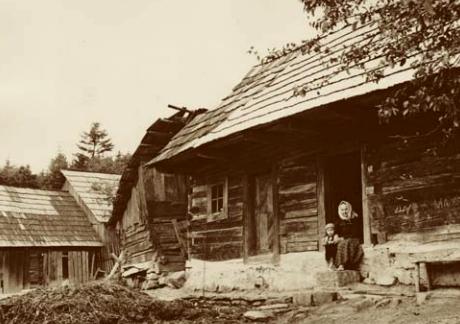Partyzáni, kterých tam bylo kolem 30, se stáhli a další události už jen pozorovali zdáli.
Chvíli jsme mysleli, že jsou osvoboditelé, no.
19.4. 1945 The Nazis burned the settlement of Ploština
Categories: Second World War , War crimes , Calendar

Burned houses and dozens of victims. Thus ended the rampage of the anti-partisan forces in the settlement of Ploština, which took place on 19 April 1945. Only one person managed to escape from the burning house into the forest.
Until the autumn of 1944, the war did not significantly affect the settlement of Ploština, a pastoral settlement below the ridge of the Vizovice Hills near Valašské Klobouk in Moravia. But because of its remote location, it became the centre of the partisans of the 1st Czechoslovak Brigade of Jan Žižka. Some parts of this unit managed to break through to Moravia during the autumn of 1944 and started their activities in the Moravian-Silesian Beskydy Mountains. "The original detachment was transformed into a brigade, the individual parts of which also operated inother Moravian regions," Pavel Kopeček writes in his book on resistance movements.
In any case, it was crucial for Ploština when two confederates, Oldřich Bat'a and František Machů, joined the partisan ranks on 18. On April 1945, they defected from the patrol and, after being denounced in Zlín, set off the next day with the partisan commando Josef and the unified SS towards Ploština.
"The partisans, of whom there were about thirty, withdrew and only observed the next events from afar. In the surrounded Ploština, investigations were under way and the traitors were marking all the partisan helpers. This was followed by looting of property, beatings and, after the burning of the cottages, the herdsmen being driven into the firesand shooting," Milan and Roman Plch describe the events in their book, "Secret Places of Nazism.
On the morning of the same day, the locals had no idea and, like any other day, went to work in the fields and forests. The prelude to the murder was already at its height. Two groups of Germans, including the traitors František Macha and Oldřich Bata, had already set off from Vizovice, which was the starting point. Already on the way, anti-partisan units were murdering people. For example, in the isolated village of Ryliska, they shot twenty-five-year-old František Belha and set fire to his house; his mother found his body in the rubble.
The result of the rampage of the anti-guerrilla units was disastrous. Ten homesteads were burnt down, 24 locals were burnt alive. Three others were executed and one killed during interrogation. "Only one inhabitant was saved, namely Jan Machů, who managed to sneak away to the forest," Martin and Roman Plch say. Until the end of the war, the man had to hide, walled up in a brick pile at the neighbours' house.
But even after the night of the war, Machů had no peace. His partisan pension was taken away. He had to declare that the partisans knew about the Nazi rampage and did not intervene. They had been warned in time and managed to escape into the forest below Klášt'ov, and the herdsmen remained in the belief that if the Germans did not find the partisans, nothing would happen to them.But a few traitors had accurately marked the houses where the partisans were hiding. Machů, who managed to escape from the burning house, ended up in prison in Uherské Hradiště under the Communists.
The Germans' rampage did not end with the burning of the settlement of Ploština on April 19, 1945. In Prlova they shot, burned and hanged 18 people, 5 of them women. Then, on May 2, they burned the nearby Vařákovy Paseky near Lačnov, where four people died. All this just a few days before the liberation of the Republic.
Sources: Secret Places of Nazism, www.vysokepole.cz, Pavel Kopeček: The Goal Was Freedom, www.pametnaroda.cz
The article is included in categories:
- Archive of articles > Wars > Second World War
- Archive of articles > Wars > Second World War > War crimes
- Archive of articles > Calendar
Post
Tak partyzáni bojovali proti nacistům, tím pádem se snažili o obranu vlasti, to, že pak nacisté vypálili jednu z osad, s tím už nemohli nic dělat, pokud by to vypálili sami partyzáni tak by to bylo jiné..
Mohli s nimi bojovat. I přesto, že byli Němci v přesile. Utekli a nezasáhli. Určitě by to nebylo poprvé, kdy by stříleli na jednotlivce z velké vzdálenosti.




